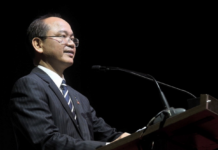KUALA PILAH, April 6 — The JPJeBid (electronic bidding for vehicle registration number plates) system is one of the highest contributors to the revenue collection of the Road Transport Department (RTD), with a total of RM177 million collected last year.
Its director-general, Datuk Zailani Hashim said the amount was through 130 serial registration numbers and that up to March almost RM60 million (34 series) was successfully collected compared to RM40 million for the same period previously.
According to him, the implementation of JPJeBid, which replaced the manual registration number tender system, also succeeded to manage the public’s perception of the transparency of tender results.
“For example, previously if those in Johor wanted to bid for a Perlis registration number, they would have to bring the forms, go to the bank and all that. But now, they can easily stay at home and bid online for whichever number they want.
“This clearly shows that we have succeeded in terms of digitalisation, many things can be settled swiftly, thus increasing the country’s revenue and lowering revenue leakage,” he told reporters after officiating a new RTD branch office in Kuala Pilah here today.
He said that apart from JPJeBid, other collections included tax revenue, renewals of driving licence and road tax, whereby the RTD managed to collect a total of RM4.1 billion last year.
“We did not even expect to get this amount following the COVID-19 pandemic and the implementation of several Movement Control Orders (MCOs), and this year we are targeting RM4.4 billion based on the digitalisation approach,” he said.
Meanwhile, Zailani said RTD would also introduce JPJeQ to improve the existing queue number system that will be launched by Transport Minister Datuk Seri Dr Wee Ka Siong on April 12 in conjunction with the RTD Day celebration.
He said through the new system, customers would only need to scan the QR code through their smartphones to obtain a queue number and check the expected waiting period before dealing at the counter.
“So, the public do not need to queue up and wait for a long time, they can settle other matters first while waiting for their turn,” he said.
Asked if RTD will increase enforcement on rear seat belt compliance judging by the public’s complacency on the matter, he said they are currently adopting an advocacy approach but did not rule out the possibility of nationwide enforcement in the future.
















